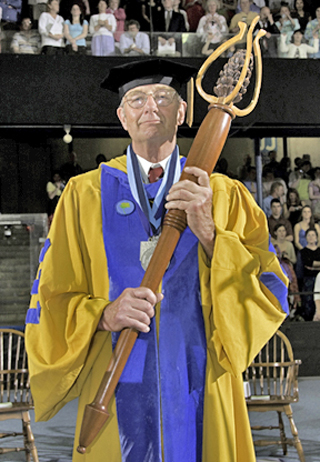In the News
Brian Robins, Sky Heller and Robert Ingraham article in the The Journal of Island and Coastal Archaeology 2016
Brian Robinson, a professor in the Anthropology Department and the Climate Change Institute, recently co-authored the paper: “Left For the Tide to Take Back: Specialized Processing of Seals on Machias Bay, Maine” with former graduate student Robert Ingraham and current graduate student Sky Heller, published in The Journal of Island and Coastal Archaeology 2016.
Marcella Sorg Promoted to Research Professor, 2016
Marcella Sorg of the Anthropology Department, Margaret Chase Smith Policy Center, and Climate Change Institute was promoted to Research Professor this year. Congratulations Marci!
Computer Model Helps Lobstermen Adapt to Changing Climate
Samuel Belknap, a Ph.D. Anthropology and Environmental Policy student at the University of Maine, is working on a project with Cooperative Extension and Sea Grant about the Gulf of Maine, lobstermen, and adapting to climate change. An article about the project is featured in the Maine Lobstermen’s Association publication Landings titled Computer Model Helps Lobstermen Adapt to Climate Change. March 2016
Historical Atlas of Maine
The Historical Atlas of Maine has received the prestigious Association of American Geographer’s Globe Book Award for Public Understanding of Geography. The atlas was edited by Stephen Hornsby, Professor of Geography and Canadian Studies, and Richard Judd, McBride Professor of History. Cartography for the atlas was by Michael Hermann, of the Canadian- American Center. Bangor Daily News 2/24/2016.
Anthropology Assistant Professor Co-Authors Article on Maine Fisheries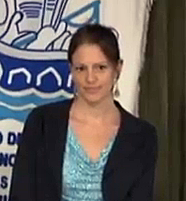
Christine Beitl, Assistant Professor of Anthropology, co-authored an article titled “How Access to Maine’s Fisheries Has Changed Over a Quarter Century: The Cumulative Effects of Licensing on Resilience” in volume 37 of Global Environmental Change, March 2016.
 For UMaine student, ancient trash heaps hold clues to healthy future fisheries
For UMaine student, ancient trash heaps hold clues to healthy future fisheries
UMaine News, Beth Staples, February 4, 2016
Bangor Daily News – Education, Monday, February 8, 2016
Sky Heller, candidate for a doctoral degree in anthropology and environmental policy at the University of Maine, is analyzing 4,200-year-old fish bones she found in trash heaps — or middens — to support healthy fisheries in the continually warming Gulf of Maine. Since the early 1980s, the temperature in the Gulf of Maine, which extends from Cape Sable in Nova Scotia to Cape Cod in Massachusetts, has climbed annually about a half-degree. To prepare for that future, Heller is investigating what the Gulf of Maine ecosystem was like 4,200 years ago. It was warm then, too, although not because of human-caused climate change. To learn which fish species thrived then in the Gulf of Maine, Heller is excavating archaeological sites along the coast of Maine and New Hampshire. More information about Sky’s research can be found at UMaine News https://umaine.edu/news/blog/2016/02/04/for-heller-ancient-trash-heaps-hold-clues-to-healthy-future-fisheries/?utm_source=University+of+Maine+Employees+%E2%80%94+September+2015&utm_campaign=03b411641e-Weekly_news_update_2_8_162_5_2016&utm_medium=email&utm_term=0_66d50b7a61-03b411641e-207717797 or Bangor Daily News http://bangordailynews.com/community/for-umaine-student-ancient-trash-heaps-hold-clues-to-healthy-future-fisheries/
UMaine offers folklore minor for students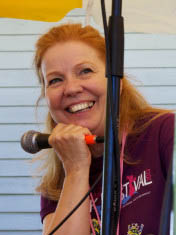
Bangor Daily News – Homestead, January 29, 2016
The state of Maine overflows with traditional beliefs, customs and stories that have passed from generation to generation by word of mouth. That’s why University of Maine professors Pauleena MacDougall and Sarah Harlan-Haughey created a folklore minor for students about two years ago. To read the article, go to http://bangordailynews.com/2016/01/27/homestead/umaine-offers-folklore-minor-for-students/?ref=HomesteadBox
Urban Vs. Rural: Who Has a Smaller Carbon Footprint?
The Take Away with John Hockenberry – Radio Interview December 11, 2015
Over the last two weeks, world leaders have gathered in Paris for COP21 have been trying to assemble a legally binding accord to protect the environment and curb greenhouse gas emissions. Cindy Isenhour, an Assistant Professor of Anthropology at University of Maine and a Cooperating Faculty with the Climate Change Institute explain some of the hidden emissions in our lives and much more in this radio interview http://www.thetakeaway.org/story/urban-versus-rural-carbon-emissions/. Isenhour is also the author of “Sustainability in the Global City: Myth and Practice.”
Researchers study lobster shell disease to protect Maine’s iconic industry
UMaine News, November 13, 2015
When Samuel Belknap, Ph.D. anthropology and environmental policy student at the University of Maine, heard an increasing number of fishermen express concerns about the spread of a lobster shell disease and its potential impacts on Maine’s iconic industry, he was intrigued. The lobsters were being affected by epizootic shell disease (ESD), caused by a bacteria that eats away at their outer shells. ESD can cause increased mortality in lobster populations, and decreases in reproductive success and market value.
Belknap teamed up with Kisei Tanaka and Jared Homola, both IGERT fellows and Ph.D students studying ecology and environmental science at UMaine. The three researchers were interested in exploring fishery-related topics in the northeastern United States. So, naturally, the iconic American lobster swam to the top of their list.
More information about this interesting topic can be found at https://umaine.edu/news/blog/2015/11/13/researchers-study-lobster-shell-disease-to-protect-maines-iconic-industry/
Archaeologists find 4,000-year-old artifacts at Seabrook nuclear plant
Brian Robinson, an associate professor at the university’s Department of Anthropology and Climate Change Institute, was accompanied on the archaeological excavation by graduate students from UMaine and the University of Connecticut. They completed the excavation over the course of three weeks, ending this past Sunday. The 4,000-year-old artifacts, which range from fish bones to archaeological remnants of Native American huts, tell researchers about the lives of indigenous people, what they fished, and possibly why some fish species no longer exist in the Gulf of Maine. To read the complete article online a seacoastonline.com, go to http://m.seacoastonline.com/article/20150813/NEWS/150819568
Marcella Sorg quoted in Articles on Drug Addiction
Marcella Sorg, a research professor with the Margaret Chase Smith Policy Center, Anthropology Department, and Climate Change Institute at the University of Maine, was quoted in a Washington Post article about a Falmouth, Maine family’s painful experience with heroin addiction.
Sorg also spoke with The Forecaster for the article, “Portland drug addiction, overdose rates exceed the rest of Maine.” Sorg, who has been reviewing overdose data provided by the state Office of the Chief Medical Examiner since 1997, said the state’s increasing problem with opioids is complex and worse in Portland than the rest of the state.
UMaine news article – http://umaine.edu/news/blog/2015/07/28/washington-post-forecaster-quote-sorg-in-articles-on-drug-addiction/
Uncovering Peru’s History
In the lower Chao Valley on the north coast of Peru, University of Maine graduate student Ana Cecilia Mauricio is uncovering history.
Mauricio defended her thesis this past May and is expected to graduate from the University of Maine with her Ph.D. in geoarcheology in August 2015. Her research focused on an archaeological preceramic period site called Los Morteros, located in Pampa de las Salinas — an area nestled between iconic Andean foothills to the east and south, the Pacific Ocean to the west and the Chao River to the north.
To read the entire article in UMaine News, go to http://umaine.edu/news/blog/2015/07/31/uncovering-perus-history/
Daniel Sandweiss Quoted in San Antonio Express-News
Daniel Sandweiss, a professor of anthropology at the University of Maine, spoke with the San Antonio Express-News for an article about a remote excavation taking place northwest of Austin, Texas. Scientists believe humans came to North America from Asia at least 14,000 years ago, according to the article. The earliest known civilization, known as the Clovis people, left stone tools that are dated to about 13,000 years ago, but artifacts that have previously been found at the Texas site and other distant sites appear to push back the arrival date by several thousand years, the article states. “There are now a lot of sites which have a strong claim to being Pre-Clovis. Not everyone accepts them and of course you can argue about any individual site, but mainstream thinking has moved back beyond the Clovis First idea,” Sandweiss said.
Marissa Bovie: Archaeological Researcher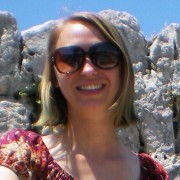
Marissa Bovie, a double major in anthropology and Earth science at the University of Maine, traveled to Croatia in 2014 as part of a team to help build a collaborative network of colleagues from different fields in relation to an archaeological study on urban transformation and landscape change along the Adriatic Sea.
This summer, Bovie returned to Croatia as a research assistant with Gregory Zaro, an associate professor and chair of the Department of Anthropology, as well as researchers from the University of Zadar, Croatia, and students from both the University of Zadar and UMaine.
The majority of UMaine student participation comes through an archaeological field school and travel course directed by Zaro. Eleven students were enrolled in the course that ran from May 15 to June 11.
The excavation, which is funded by the National Geographic Society, is the next phase in building a long-term program of study concerning human society, environment and climate in the eastern Adriatic region. The initiative to study at the Nadin archaeological site grew out of Zaro’s Fulbright experience at the University of Zadar in 2013.
The project work will generate archaeological data related to urban form, spatial organization, economy, subsistence and environment from the site’s inception in the Iron Age. The project also will work to more precisely delineate the site’s chronology, an essential prerequisite to articulating changes in urban form with broader changes in landscape and environment.
To read the complete article in UMaine News, go to http://umaine.edu/news/blog/2015/07/06/marissa-bovie-archaeological-researcher/
Anthropology Top Graduating Senior Awards for 2014-2015
Kelly Edwards (double major in English and Anthropology) and Eliza Kane (double degree in Earth Sciences and Anthropology) received the Department of Anthropology Top Graduating Senior Award.
Dan Sandweiss is the 2015 CLAS Outstanding Faculty in Research/Creative Achievement Award winner
Dr. Dan Sandweiss, professor of anthropology and quaternary and climate studies, is an internationally renowned researcher in Andean archaeology and climate change, recognized for his research on the prehistory of El Niño, ancient maritime adaptations, and coastal cultures. For more information about Dan, go to: http://umaine.edu/las/college-news/outstanding-faculty-award-in-researchcreative-achievement-recipient/outstanding-faculty-award-in-research-creative-achievement/
Sarah Ebel, Student Researcher: Transparency and Communication Essential to Research Partnerships with Fishermen
In a concept that touches the very mission of sustainability, Sarah Ebel and her colleagues went directly to Maine lobstermen to ask questions. They were not merely asking these stakeholders for information about what they do. They were asking lobsterman how they think about their role in collaborative research – if they think they have a role at all.
A very different set of questions.
Ebel, a PhD student in UMaine’s Department of Anthropology, conducted the interviews with her advisor, Christine Beitl, Assistant Professor of Anthropology. They were part of a yearlong study funded by the Senator George J. Mitchell Center for Sustainability Solutions, which focused on broadening the scope of the Mitchell Center’s community-based mission. To read more, go to http://umaine.edu/mitchellcenter/news/news-2/student-researcher-transparency-and-communication-essential-to-research-partnerships-with-fishermen/
Sam Belknap’s work featured in Maine Climate News
 Samuel L. Belknap III is a PhD student in the Adaptation to Abrupt Climate Change National Science Foundation IGERT fellowship program pursuing a degree in Anthropology and Environmental Policy. His work focuses on how rapid changes to earth’s climate system impact resource harvesters. Specifically, how extreme ocean events impact the perceptions and behaviors of marine-resource harvesters. To read the article, go to http://umaine.edu/maineclimatenews/research-highlights/
Samuel L. Belknap III is a PhD student in the Adaptation to Abrupt Climate Change National Science Foundation IGERT fellowship program pursuing a degree in Anthropology and Environmental Policy. His work focuses on how rapid changes to earth’s climate system impact resource harvesters. Specifically, how extreme ocean events impact the perceptions and behaviors of marine-resource harvesters. To read the article, go to http://umaine.edu/maineclimatenews/research-highlights/
Sandweiss Honored for Pioneering Archaeology Work, AP Reports
The Associated Press reported Daniel Sandweiss, an archaeologist at the University of Maine, was named a Fellow by the American Association for the Advancement of Science (AAAS) for his contributions to the field. Alan Leshner, CEO and executive publisher of Science, says Sandweiss’ notable discoveries include his “pioneering interdisciplinary studies of early colonization of South America and the origins of El Niño.” Sandweiss, a professor of anthropology and quaternary and climate studies and cooperating professor of Earth and climate sciences and global policy, has been at UMaine since 1993. The Maine Public Broadcasting Network, WABI (Channel 5), Portland Press Herald and the Worcester Telegram & Gazette carried the AP report. Longer version of the article.
Anthropology News
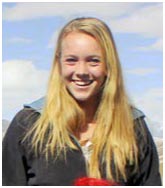 Ariel Bothen (double major Anthropology and International Affairs/Political Science) was awarded College of Liberal Arts and Sciences Outstanding Graduating Senior– the first Anthropology student to win such an award.
Ariel Bothen (double major Anthropology and International Affairs/Political Science) was awarded College of Liberal Arts and Sciences Outstanding Graduating Senior– the first Anthropology student to win such an award.
She also received the Department of Anthropology Outstanding Student Award. As part of the award, her name will be added on a plaque in the Student Lounge, and she will receive a bookstore voucher.
Kurt Rademaker, a University of Maine visiting Assistant Professor in Anthropology and alumnus (Ph.D. 2012), is highlighted in the News & Analysis section of the May 9, 2014 journal Science. New Sites Bring the Earliest Americans Out of the Shadows
Cindy Isenhour, a University of Maine Assistant Professor in the Anthropology Department, received great recognition last month in Anthropology News regarding her work related to energy and consumption. To read more, go to:
http://www.anthropology-news.org/index.php/2013/12/16/from-sweden-to-china/
UMaine News & Bangor Daily News
& Bangor Daily News
Kurt Rademaker, a University of Maine alumnus and faculty associate in the Department of Anthropology and a associate graduate faculty member at the Climate Change Institute, recently won the Tübingen Research Prize in Early Prehistory and Quaternary Ecology. The international prize was for his ice age research related to the first human settlement in the high Peruvian Andes.
For more informatin, please read the UMaine News release at: http://umaine.edu/news/blog/2014/01/07/award-winning-ice-age-research/ and the Bangor Daily News article http://bangordailynews.com/2014/01/24/uncategorized/umaine-grad-wins-prestigious-prizes-for-andes-ice-age-research/?ref=regionpenobscot
Bangor Daily News
Marcella Sorg, a University of Maine Research Associate Professor in the Department of Anthropology, Climate Change Institute, and Margaret Chase Smith Policy Center, was recently highlighted in an article in the Bangor Daily News titled State’s forensic anthropologist uses bones, science to tell a dead person’s story. Marcella Sorg, forensic anthropologist for the Maine medical examiner’s office, does forensic skeletal investigations using science to make determinations about a person’s identity or cause of death — sometimes dating back decades — and whether the person’s death was a result of a crime. To read more go to http://bangordailynews.com/2014/01/19/news/state/states-forensic-anthropologist-uses-bones-science-to-tell-a-dead-persons-story/
UMaine Today
A UMaine Today article titled “Perspective of Preservation” features Kourtney Collum and Samuel Belknap; the first students to enroll in the Anthropology and Environmental Policy doctoral program at the University of Maine. To read the article on pages 55-57, go to http://umainetoday.umaine.edu/download/ and download the pdf of the UMaine Today fall 2013 issue.
Lisa Neuman “Caned”
Lisa Neuman was caned by Pauleena MacDougall for her new book Indian Play: Indigenous Identities at Bacone College published by University of Nebraska Press. The book is based on archival and ethnographic research, including the participation of more than one hundred Bacone College alumni, staff, and faculty who were at the school from the 1920s – 1950s. The Rexford St. John Boyington Memorial Walking Stick (the cane) is passed from faculty to faculty at the publication of a book.

A Fulbright Experience in Croatia

Associate Professor Greg Zaro was awarded a Fulbright Scholar grant to teach and conduct research at the University of Zadar, Croatia, during the Spring 2013 semester. Greg, his wife Sasha, and son Austin spent a total of seven months in Croatia, five of which were in the city of Zadar, situated along the Adriatic coast in Northern Dalmatia. Read Greg’s blog to learn about his experiences abroad.
Mapping the Empire
Historical research traces Britain’s ambitious efforts to survey its North American holdings.
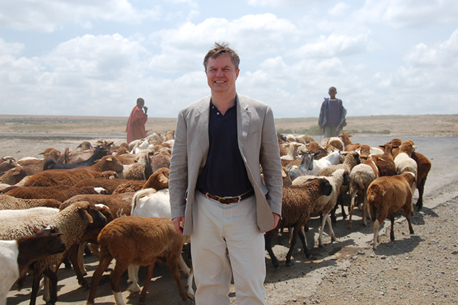
Rolled up and tucked away in a corner of the British Library in London sits a hand-drawn map of the Maine coast, created in the years just before the American Revolution.
“It’s breathtaking to see,” says Stephen Hornsby, a professor of geography and Canadian studies at the University of Maine and the director of UMaine’s Canadian-American Center. “Absolutely magnificent. It’s part of the heritage of the state, but it’s in London. It’s unknown in Maine.”
Greg Zaro Earns Tenure & Promotion 2014
Congratulations to Greg Zaro for earning Tenure & Promotion to Associate Professor of Anthropology and Climate Change.
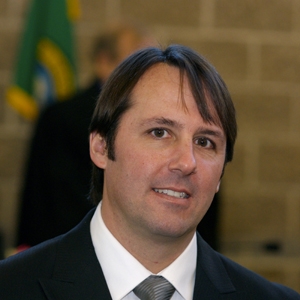
Professor Emeritus Alaric Faulkner, 1945-2011
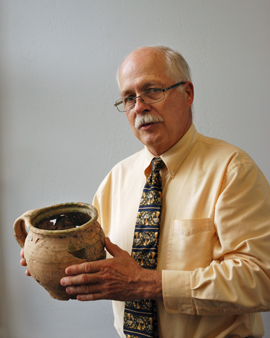
We are saddened by the loss of our friend and colleague Alaric Faulkner, a distinguished historical archaeologist who served 30 years on the University of Maine anthropology faculty. He died on March 18 at the age of 66.
Professor Faulkner, who retired in 2008 and was granted emeritus status in recognition of his scholarly achievements, had been ill for some time.
“Ric is the consummate, well-rounded scholar, whose contributions to the academic endeavors of the University of Maine are greatly appreciated,” wrote his anthropology faculty colleague Prof. Kristin Sobolik in 2008. Citing Faulkner’s “incalculable” impact on hundreds of students, along with his contributions to efforts that enhance understanding and appreciation of Maine’s heritage, Sobolik referred to Faulkner as a “historical archaeologist extraordinaire.”
Please see the full UMaine News story here.
Lisa Neuman Earns Tenure and Promotion 2011
Congratulations to Lisa Neuman for earning Tenure and Promotion to Associate Professor of Anthropology and Native American Studies! She is shown here with Chair Kristin Sobolik at the College of Liberal Arts and Sciences Award Ceremony.
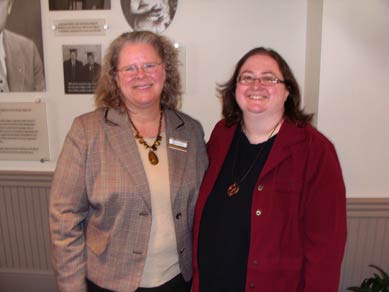
Jim Roscoe Awarded Research and Creative Achievement Honor
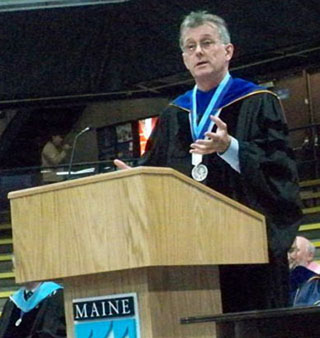
Paul “Jim” Roscoe was awarded the Presidential Outstanding Research and Creative Achievement Award for 2010. This is one of the top 4 honors bestowed on deserving faculty. Jim presented his speech (PDF) at the Graduate Recognition Ceremony.
Brian Robinson Earned Tenure and Promotion in 2010
Brian Robinson earned tenure and promotion to Associate Professor of Anthropology and Climate Change this year. Congratulations Brian!!
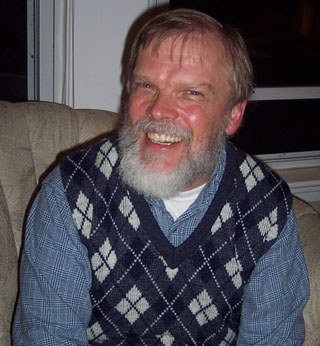
Kristin Sobolik “Caned”
Kristin Sobolik was caned by Dan Sandweiss for her new book on Paleonutrition published by the Arizona Press. The Rexford St. John Boyington Memorial Walking Stick (the cane) is passed from faculty to faculty at the publication of a book.
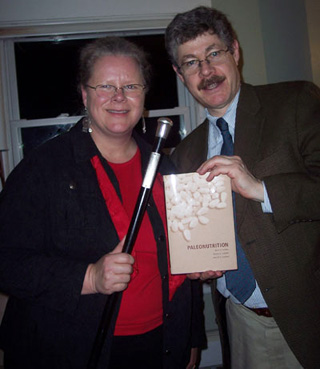
Jim Acheson Awarded Distinguished Maine Professor 2009 Honor
Our own Jim Acheson was awarded the most prestigious UMaine honor at the Honors Convocation this year – that of Distinguished Maine Professor! The DMP is awarded by the Alumni Association in honor of excellence in teaching, research, and service. These areas of Jim’s life have been intertwined during his many years of service to the university, our students, and the state of Maine. Jim’s environmental policy research on the lobstering industry in Maine is lauded as one of the most successful environmental policy initiatives nationwide, and for which he was honored with an Official Expression of Recognition from the 121st State of Maine Legislature. Maine’s students have greatly benefited from Jim’s expertise and skill in the classroom and willingness to train future policy makers in the field. Maine has gained an environmental policy expert whose ideas and abilities have provided the crucial link between the cultural human dimension to environmental understanding. Congratulations to Jim!!!
